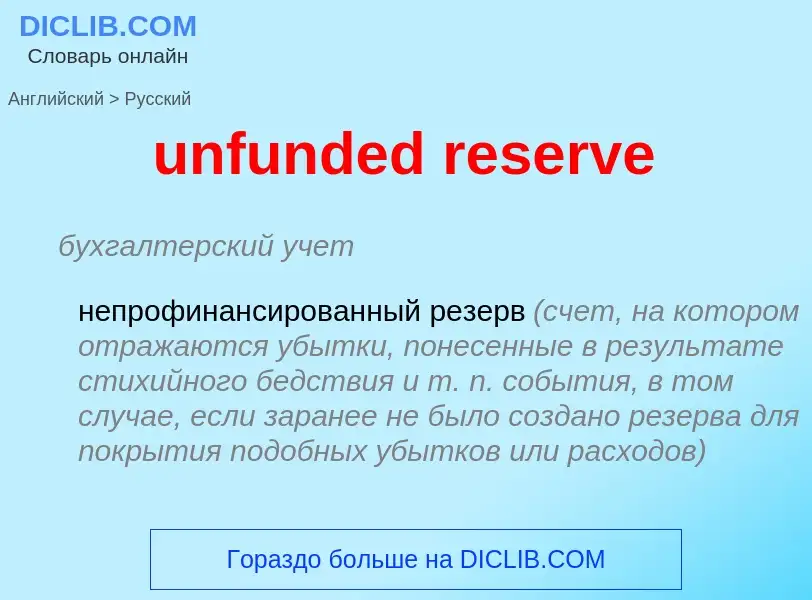Traduction et analyse de mots par intelligence artificielle ChatGPT
Sur cette page, vous pouvez obtenir une analyse détaillée d'un mot ou d'une phrase, réalisée à l'aide de la meilleure technologie d'intelligence artificielle à ce jour:
- comment le mot est utilisé
- fréquence d'utilisation
- il est utilisé plus souvent dans le discours oral ou écrit
- options de traduction de mots
- exemples d'utilisation (plusieurs phrases avec traduction)
- étymologie
unfunded reserve - traduction vers Anglais
бухгалтерский учет
непрофинансированный резерв (счет, на котором отражаются убытки, понесенные в результате стихийного бедствия и т. п. события, в том случае, если заранее не было создано резерва для покрытия подобных убытков или расходов)
антоним
Смотрите также
бухгалтерский учет
резервный фонд (фонд, создаваемый для покрытия ожидаемых расходов)
Смотрите также
Définition
Wikipédia
An unfunded mandate is a statute or regulation that requires any entity to perform certain actions, with no money provided for fulfilling the requirements. This can be imposed on state or local government, as well as private individuals or organizations. The key distinction is that the statute or regulation is not accompanied by funding to fulfill the requirement
An example in the United States, would be those federal mandates that induce "responsibility, action, procedure or anything else that is imposed by constitutional, administrative, executive, or judicial action" for state and local governments and/or the private sector.
As of 1992, 172 federal mandates obliged state or local governments to fund programs to some extent. Beginning with the Civil Rights Act of 1957 and the Civil Rights Act of 1964, as well as the Voting Rights Act of 1965, the United States federal government has designed laws that require state and local government spending to promote national goals. During the 1970s, the national government promoted education, mental health, and environmental programs by implementing grant projects at a state and local level; the grants were so common that the federal assistance for these programs made up over a quarter of state and local budgets. The rise in federal mandates led to more mandate regulation. During the Reagan Administration, Executive Order 12291 and the State and Local Cost Estimate Act of 1981 were passed, which implemented a careful examination of the true costs of federal unfunded mandates. More reform for federal mandates came in 1995 with the Unfunded Mandates Reform Act (UMRA), which promoted a Congressional focus on the costs imposed onto intergovernmental entities and the private sector because of federal mandates. Familiar examples of Federal Unfunded Mandates in the United States include the Americans with Disabilities Act and Medicaid.

